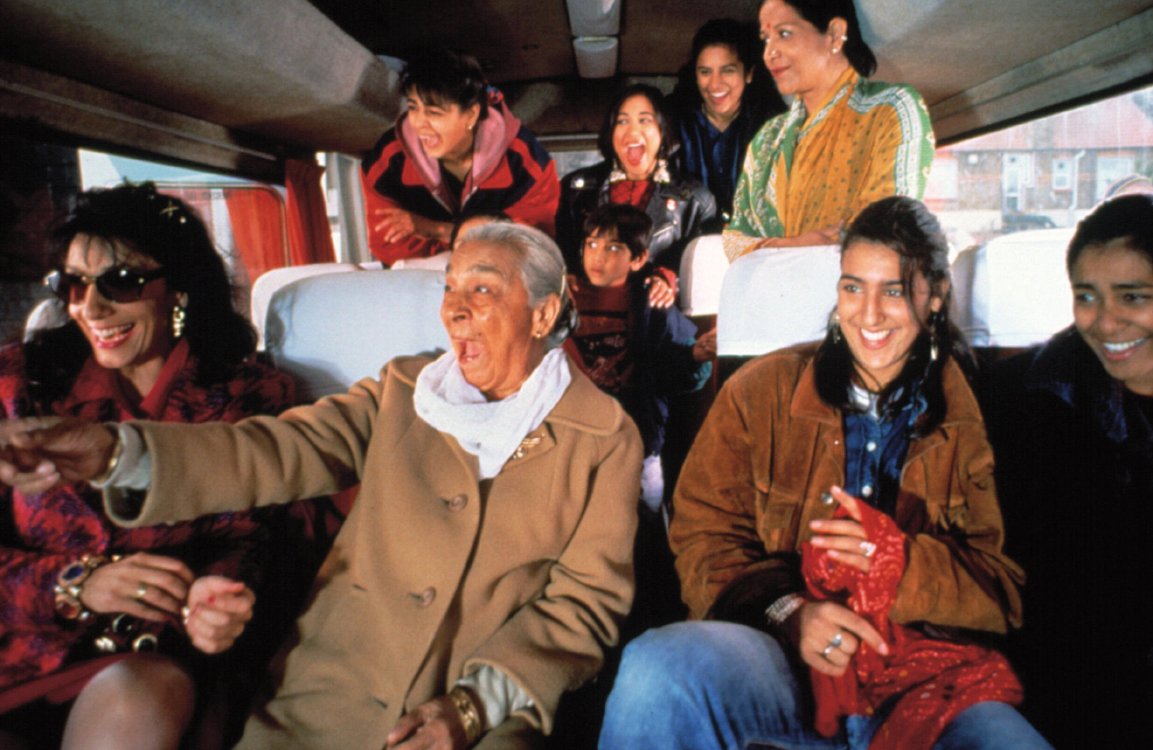Bhaji on the Beach: The Original Brit Asian Girl Power Flick
Ah, the 90s! British Desis were trendy, with an underground music scene and our faces on primetime telly, including hit sketch show Goodness Gracious Me. It’s cast member Meera Syal was also the screenwriter behind the critically acclaimed Bhaji on the Beach. Directed by Gurinder Chadha, who went on to make a spate of South Asian diaspora-themed movies during the 1990s-2000s, the film is light years ahead of later, more male-centric films like East is East (1999) and Four Lions (2010).
Featuring an ensemble sisterhood cast, it blends South Asian and English quirks; overcast Blackpool skies; a soundtrack of U2, bhajans and a desi style ‘Summer Holiday’, chili powder on fish and chips, plus conservative aunties entertained by a tacky seaside strip show.
Despite their differences, a gaggle of intergenerational women (single, married, divorced and widowed) are rallied together by community worker Simi (Shaheen Khan), styled in desi jewellery with leather jacket, on a seaside daytrip.
Newly single mother Ginder (Kim Vithana) has left an abusive marriage, with support from Saheli Sisters; a reference to real-life organisation Southall Black Sisters; a lifeline for black and brown communities escaping gender-based violence.
Traditional Asha (Lalita Ahmed)’s surreal daydreams challenge her moral upstanding; imagining her ‘Western’ counterpart Rekha (Souad Faress), sauntering through a Hindu temple, in short skirt and heels, to light up a cigarette from a prayer tray candle, and a Bollywood musical fantasy with the English gent courting her on beachfront. She smartly turns down his WOC fetish charms, confirmed when she sees him try the same pervy move on some hijab-clad ladies
There’s a black-brown love story (similarly explored in US-based Mira Nair’s Mississippi Masala (1991) starring Denzel Washington), with Hashida (Sarita Khajuria) falling pregnant by boyfriend Oliver (Mo Sesay). He confronts her hiding their relationship and dream of pursing art to be the ‘perfect daughter’ studying medicine. She argues back with that familiar self-imposed brown girl burden of “sorting this all out herself”.
Oliver’s best friend warns him on the ‘grief’ this kind of interracial dating brings and the lack of solidarity in their multicultural university, as seen in tense banter with fellow East Asian hallmates. Meanwhile, the women can’t escape racist misogyny on a day away; harassed by a gang of white lads on the road, who pull that classically British ‘moonie’, spitting and cursing when the group dare to defend themselves. A touching scene sees Oliver advised on impending parenthood by his father (Rudolph Walker), who showcases Chadha’s penchant for gentle, stable father figures, while older women and younger men uphold patriarchal power.
Ginder’s ex-mother-in-law demands her son - abusive husband Ranjit (Jimmi Harkishin) track her down, with the aid of his two brothers – one a misogynist, who violently attacks Ginder’s father and bullies the youngest brother for being ‘under the thumb of his wife’. A motley trio reflecting a cross-section of male brown trauma and how the roots of violence and misogyny inflicting South Asian culture still need to be confronted.
When will we dare to touch as honestly on these complexities in our future story-telling on screen?
“You’ll never please everyone, so you might as well please yourself”, Ginder advises Hashida on the windswept beach, before being shamed by deckchair-seated aunties, when her pregnancy is accidentally revealed. The hilariously-named twins Madhu and Ladhu defend her, making the now sadly ironic point that, “this is the twentieth century you know”.
““You’ll never please everyone, so you might as well please yourself””
The twins also tackle double standards of “dating white” on their seaside double date. When one criticises the other for changing her looks, they respond how ‘doing this for white prats is no different to brown prats doing it for white girls’. Has anything changed today? Hashida also stands up to multiple prejudices her generation face; defying both the older women who bad-mouth her and a racist café owner, with a blast of hot tea.
A light-hearted ending provides hilarious karma for the conservative aunties, who give in to the holiday vibe when they find themselves unexpectedly centre stage at a surprise strip show and we witness auntie Pushpa being grinded on - and loving it!
Words: Reshma Madhi










